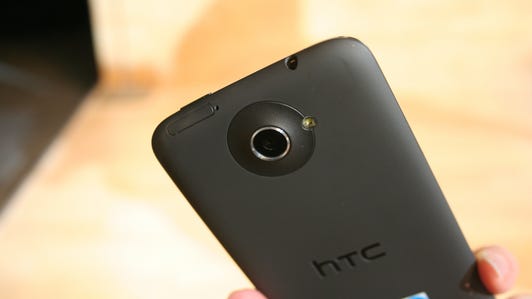BARCELONA, Spain–If it’s a quad-core Ice Cream Sandwich smartphone you want, then add the HTC One X to your list. Just announced today at Mobile World Congress, the One X is the flagship phone in HTC’s new “HTC One” family of devices.
The One X features Android 4.0, the most up-to-date (and coveted) version of the Android operating system, topped with a revamped version of the HTC Sense interface, Sense 4.0. Unlike the buttonless Samsung Galaxy Nexus, the One X features three touch-sensitive buttons below the display, for back, Home, and pulling up recent apps.
Related stories
- HTC set to launch One X quad-core superphone?
- LG to drop new ICS phones, L-Style handsets
- Sadly, AT&T’s HTC One X won’t be quad-core (and here’s why)
Specs are appropriately vaulted on this handset, with a large 4.7-inch Super LCD 2 display that features a 1,280×720-pixel HD resolution and Gorilla Glass. With a 0.36-inch (9.27-millimeter) profile, the black or white One X is a pretty big device, the same size as the HTC Titan and the Sensation XL.
For multimedia, the One X sports an 8-megapixel camera with five levels of LED flash and automatic focus, plus recording and playback support for 1080p HD video. There’s a 1.3-megapixel camera on the front that’s capable of shooting 720p HD video. There’s also Beats Audio onboard, and a music hub that automatically pulls together your music apps.
Sure, the 8-megapixel rear-facing camera produces half the image size of the 16-megapixel camera we saw at CES on the Titan II bound for AT&T, but HTC swears this is its most advanced yet, thanks to a new lens (f/2.0), better image sensor, and an imaging chip dedicated to processing photos and videos.
Under the hood is that 1.5GHz quad-core Nvidia Tegra 3 processor we mentioned, one of the first phones to fire on four cylinders, as well as an 1,800mAh battery. The HTC One X has Bluetooth 4.0 as well. There are 32GB of user-accessible storage but no expandable memory slot; instead, HTC and Dropbox are offering 25GB of online storage, similar to Microsoft’s setup on Windows Phone.
A closer look at the HTC One X (photos)






My take
I personally like the phone’s look a lot (especially the white color)–it’s clean and sharp, and it’s big without feeling overly bulky. Maybe I’m becoming more conditioned to phones with larger screens, but the size still won’t win everyone over. However, the look and feel, and the tech specs are certainly capable of doing so.
Aesthetics is one of HTC’s strengths, and the company once again scores points for software visuals like the card motif in the recent apps tray, the car dock, and music hub. I appreciate how HTC incorporated some of the best features and design cues of ICS, and toned back the HTC “look,” which in truth, was beginning to feel like more of the same.
Much of HTC’s backend work was done on the camera, and while it’s hard to comment on the quality of the low light shots without thorough testing, I will say that shutter speed in my tests was fast. HTC amended some of the on-screen icons and controls. I really like separating the camera and video buttons and making them equally accessible, but I do think some of those other icons were a tad overdesigned. Still, that’s more a quibble than a serious reason to steer clear.
Beats Audio is quickly becoming a signature feature, and the difference between songs playing with it and without it is noticeable, so it’s nice to see it taking a center role, however, the audio quality alone won’t sell phones.


Now playing:
Watch this:
HTC One X
2:41
Speed, pricing, availability
As far as speeds go, this unlocked global version we’re seeing here is capable of GSM HSPA+ 42 speeds. Americans waiting to get their hands on the device will be happy to know that AT&T has snagged the One X with LTE; however, our version won’t come with quad-core, since Tegra 3 isn’t LTE-capable just yet. Instead, it’ll pack a dual-core Qualcomm Snapdragon S4 processor. It’s a pity that one of the world’s first quad-core smartphones won’t be quad-core in the U.S., but with LTE and a dual-core ticker, it should still be plenty fast.
There’s no pricing or availability yet, but the company does expect to make it available to its first regions within the next 60 days. Hmm, not to get ahead of myself, but that time frame would perfectly coincide with an AT&T CTIA announcement in early May.
Overall, HTC’s efforts in the One X show, and this is by far the most technologically advanced of the three phones in the HTC One family. The One X is a global win for quad-core, at a time when consumers are bound to associate more cores with speed, but a loss for claiming it as the first quad-core phone in the U.S. market. I should mention, though, that it isn’t necessarily true that a dual-core phone made by one chipmaker would be necessarily slower than a quad-core processor made by another. This is another instance where we’ll need to get our hands on both versions for some benchmarking.
I, for one, will be excited to see the HTC One X reach the US, and watch how the brand grows.



